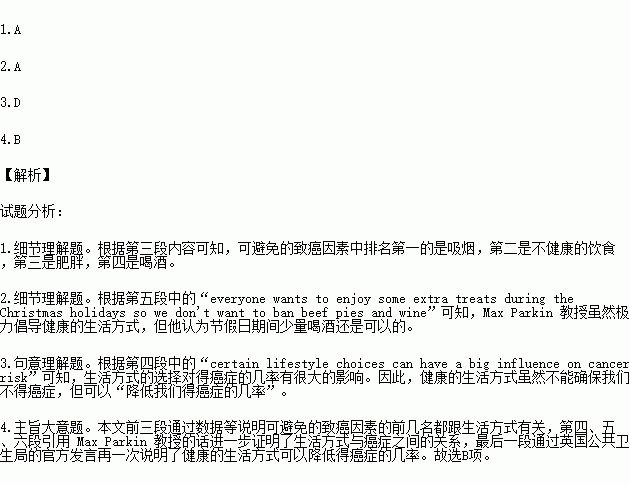题目内容
阅读理解
More than 4 in 10 cancers — 600,000 in the UK alone — could be prevented if people led healthier lives, say experts. The population of the UK is about 63,000,000.
Latest figures from Cancer Research UK show smoking is the biggest avoidable risk factor (因素), followed by unhealthy diets. The charity advises people to live healthily, limit alcohol intake and do regular exercise.
According to the figures from 2007 to 2011, more than 300,000 cases of cancer recorded were linked to smoking. A further 145,000 were linked to unhealthy diets containing too much processed food. Obesity contributed to 88,000 cases and alcohol to 62,200. Sun damage to the skin and physical inactivity were also contributing factors.
Professor Max Parkin, a Cancer Research UK statistician, says, “There's now little doubt that certain lifestyle choices can have a big influence on cancer risk, with research around the world all pointing to the same key risk factors.”
“Of course everyone wants to enjoy some extra treats during the Christmas holidays so we don't want to ban beef pies and wine but it's a good time to think about taking up some healthy habits.”
“Leading a healthy lifestyle can't guarantee someone won't get cancer but we_can_stack_the_odds_in_our_favour by taking positive steps.”
Public Health England says a healthy lifestyle can play an important role in reducing cancer risk. It says campaigns such as Smokefree, Dry January and Change4Life Sugar Swaps all aim to raise public awareness. It's important that we not only continue to make progress in noticing cancer earlier and improving treatments, but helping people understand how they can reduce their risk of developing cancer in the first place remains important in dealing with cancer.
1.Which of the following is the third biggest avoidable cancer factor?
A.Obesity. B.Alcohol intake.
C.Unhealthy diets. D.Physical inactivity.
2.According to Professor Max Parkin, ________.
A.it's OK to drink wine during festivals
B.the causes of cancer are still unclear now
C.unhealthy food should be completely banned
D.a healthy lifestyle will protect us from cancer
3.By saying the underlined words in Paragraph 6, Professor Max Parkin means we can________.
A.help others
B.improve our lives
C.discover cancer early
D.decrease our cancer risk
4.What's the main idea of the text?
A.Most cancers are caused by smoking.
B.Cancer is greatly linked to our lifestyle.
C.There are different factors that lead to cancer.
D.Public awareness should be raised to prevent cancer.
 学期复习一本通学习总动员期末加暑假延边人民出版社系列答案
学期复习一本通学习总动员期末加暑假延边人民出版社系列答案 芒果教辅暑假天地重庆出版社系列答案
芒果教辅暑假天地重庆出版社系列答案


 ),并在其下面写出该加的词。
),并在其下面写出该加的词。